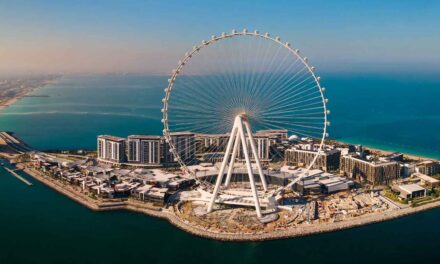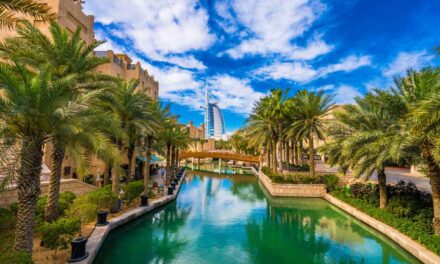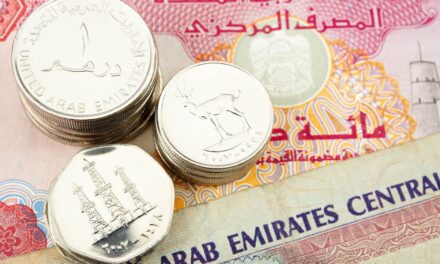For those considering a move to the United Arab Emirates, the cost of living in Dubai and Abu Dhabi can be a significant deciding factor. Both cities are well-known for their modern architecture, luxurious lifestyle, and thriving business sectors. However, some differences in their costs of living exist.
- Key Takeaways
- Geographical Overview
- Economic Context
- Cost of Accommodation in Dubai
- Cost of Accommodation in Abu Dhabi
- Everyday Expenses in Dubai
- Everyday Expenses in Abu Dhabi
- Dining and Entertainment in Dubai
- Dining and Entertainment in Abu Dhabi
- Average Salaries in Dubai
- Average Salaries in Abu Dhabi
- Tax Considerations
- Conclusion
- Frequently Asked Questions
- What is the difference in housing costs between Dubai and Abu Dhabi?
- How do transportation costs compare in Dubai and Abu Dhabi?
- Is the cost of groceries higher in Dubai or Abu Dhabi?
- How does the cost of eating out differ between the two cities?
- What are the utilities costs like in Dubai vs Abu Dhabi?
- How do childcare costs compare in Dubai and Abu Dhabi?
Dubai, as a global city and business hub, tends to be more expensive in terms of accommodation and everyday living. Abu Dhabi, the capital of UAE, is known for its cultural attractions and laid-back atmosphere, offering a more affordable lifestyle. Although both cities provide world-class services and amenities, they have distinct features that can impact the cost of living for expats.
Key Takeaways
- Dubai and Abu Dhabi are two of UAE’s major cities, both offering unique lifestyles and differing costs of living
- Accommodation, everyday expenses, and dining options in Dubai tend to be higher compared to Abu Dhabi
- Average salaries, tax considerations, and economic context should also be considered when assessing the cost of living in these cities
Geographical Overview
As someone who has spent time in both Dubai and Abu Dhabi, I can confidently provide a neutral and clear geographical overview of these two cities.
Dubai, located on the southeast coast of the Persian Gulf, is the most populous city in the United Arab Emirates as well as a global city and business hub. It has a diverse and multicultural population, being home to hundreds of nationalities. My personal experience in Dubai aligns with its reputation for iconic skyscrapers, luxurious shopping malls, and a vibrant nightlife scene.
Abu Dhabi, on the other hand, is the capital of the United Arab Emirates and sits off the mainland on an island in the Persian Gulf. Although it’s only a two-hour drive from Dubai, Abu Dhabi offers a more laid-back and culturally focused experience. During my time there, I enjoyed visiting important cultural sites such as the Sheikh Zayed Grand Mosque, the Louvre Abu Dhabi, and the Emirates Palace.
Given their relatively close proximity, the climate in both cities is similar – they are characterized by hot, arid desert weather. I found the summers particularly hot and humid, while the winters are comfortable and mild.
In terms of the cost of living, it is important to note that both cities have their own unique characteristics. Renting a 1-bedroom apartment in Dubai can expect annual rental costs of AED 64k on average, while a similar property in Abu Dhabi would cost AED 52k on average, depending on the area.
I hope this geographical overview provides a clear and concise understanding of the two cities for anyone considering moving or just visiting Dubai or Abu Dhabi.
Economic Context
In order to better understand the cost of living differences between Dubai and Abu Dhabi, I will provide an overview of the economic context surrounding these two prominent cities in the United Arab Emirates (UAE). Both cities have experienced rapid growth over the past few decades and are renowned for their luxurious lifestyles, modern infrastructures, and business opportunities.
The real estate market plays a major role in driving cost of living distinctions between the two cities. While both cities offer a diverse range of budget-friendly and luxurious properties, Dubai’s average rent for 2 and 3-bed flats is AED 103k and AED 172k respectively, whereas Abu Dhabi’s average rent for similar units is AED 75k and AED 108k respectively, making Abu Dhabi’s housing market generally more affordable according to Bayut.
In terms of the overall cost of living, based on Expatistan’s comparison, the cost of living in Abu Dhabi is 10% cheaper than in Dubai. This includes expenses such as food, transportation, utilities, and entertainment. In addition, Numbeo’s cost of living comparison also supports this claim, showing that the cost of living index for Abu Dhabi is lower than that of Dubai.
A breakdown of the cost differences between the cities reveals that restaurant meals in both Dubai and Abu Dhabi are generally priced similarly, with an inexpensive meal costing around 40 AED. However, a three-course meal for two people at a mid-range restaurant is slightly more expensive in Dubai, with an average cost of 280 AED compared to 255 AED in Abu Dhabi according to Numbeo.
In summary, though Dubai is often perceived as the more expensive city to live in as compared to Abu Dhabi, the differences in the overall cost of living are not as vast as one might initially assume. Understanding the economic context of these two cities helps provide a well-rounded view of their cost of living variations and offers insights into the factors contributing to the unique lifestyle options available in each location.
Cost of Accommodation in Dubai
As someone who has researched the cost of living in Dubai, I’d like to share some insights on the accommodation costs in this vibrant city. From renting apartments to investing in real estate, I’ll cover some key aspects to help you get a better understanding of the housing market in Dubai.
Rent in Dubai
Renting in Dubai can vary greatly depending on the location and type of property you’re looking for. For a 1-bedroom apartment in the city, you can expect an average annual rental cost of AED 64k. However, the prices can go up or down depending on the area and proximity to popular landmarks or business hubs.
To give you a better idea, let me break down the average rents for different types of apartments:
- 1-bedroom apartment: AED 64,000 per year
- 2-bedroom apartment: AED 103,000 per year
- 3-bedroom apartment: AED 172,000 per year
Please note that these are average figures, and the actual rental prices may vary.
Real Estate in Dubai
For those interested in investing in property or purchasing a home in Dubai, the real estate market offers a wide variety of options. From luxurious villas to modern high-rise apartments, there is something for every taste and budget.
The property prices in Dubai tend to be more expensive compared to neighboring cities like Abu Dhabi. However, it’s important to consider factors like location, amenities, and property size when comparing real estate costs.
Here are some average property prices for reference:
- 1-bedroom apartment: AED 1 million
- 2-bedroom apartment: AED 1.5 to 2 million
- 3-bedroom apartment: AED 2.5 to 4 million
Remember that these figures are approximate, and the actual prices may vary depending on the specific property and area.
In conclusion, the cost of accommodation in Dubai can range from affordable to luxurious, depending on your preferences and budget. Whether you’re renting or buying, it’s essential to research and compare the options available to make an informed decision.
Cost of Accommodation in Abu Dhabi
Rent in Abu Dhabi
When it comes to renting in Abu Dhabi, the prices can vary based on the type of property, its location, and other factors. For instance, renting a 1-bedroom apartment in Abu Dhabi can cost you around AED 52k on average per year, depending on the area [^1^]. The prices can go up or down depending on whether the apartment is in a luxury development or a more budget-friendly neighborhood.
I’d also like to note that the prices for renting larger properties in Abu Dhabi are fairly competitive. For example, a 2-bedroom flat has an average annual rent of around AED 103k, while a 3-bedroom apartment can set you back about AED 172k per year [^1^].
Real Estate in Abu Dhabi
If you’re considering investing in real estate or purchasing a property in Abu Dhabi, it’s important to know that the market can be somewhat volatile. However, compared to Dubai, the real estate prices in Abu Dhabi tend to be more stable and lower.
A recent report from the Central Bank of the UAE confirmed that the housing prices in Abu Dhabi decreased by 1.9% in Q4 of 2021, while the prices in Dubai surged by 8.9% in the same period [^2^]. This could make Abu Dhabi an attractive option for those looking to buy a property in the UAE, as it may offer a more stable investment.
In conclusion, while the costs of accommodation in Abu Dhabi might not be as high as in Dubai, it’s still crucial for potential renters and buyers to research and consider all aspects of their preferred location, property type, and of course, their budget.
Here is a brief overview of the everyday expenses in Dubai.
Everyday Expenses in Dubai
Groceries in Dubai
In Dubai, I find that the cost of groceries can vary quite a bit depending on where I choose to shop. Local supermarkets and hypermarkets tend to have reasonable prices, but imported products can be more expensive. My typical grocery bill includes items like fresh fruits, vegetables, meat, poultry, dairy, and staples like rice and bread. On average, the cost for my groceries is higher compared to Abu Dhabi.
Transport in Dubai
For me, getting around Dubai is quite convenient and affordable, thanks to the well-developed public transport system. I mainly use the metro, buses, and taxis to commute within the city. A monthly public transport pass costs around AED 350, while a short taxi ride can cost about AED 12. When comparing the transport costs, I’ve noticed that they are quite similar between Dubai and Abu Dhabi.
Utilities in Dubai
My monthly utilities bills include charges for electricity, water, and gas, which I find to be a bit higher than in Abu Dhabi. For a 2-bedroom apartment in Dubai, I pay about AED 800, depending on my usage. On top of that, I also spend around AED 400 for a high-speed internet connection, and AED 150 for my mobile phone plan. Overall, my utility expenses in Dubai are slightly higher than they would be in Abu Dhabi.
Everyday Expenses in Abu Dhabi
Groceries in Abu Dhabi
When it comes to groceries, I’ve found that the cost of items can vary significantly between supermarkets. However, generally speaking, produce, dairy products, and meats seem to be reasonably priced. For example, a liter of milk typically costs around AED 5, while a loaf of bread may cost around AED 4. Here are some additional examples:
- A dozen eggs: AED 10
- 1 kg of apples: AED 8
- 1 kg of tomatoes: AED 6
Keep in mind that many supermarkets offer weekly promotions, so I often find it helpful to check flyers for discounts on items I regularly purchase.
Transport in Abu Dhabi
Public transportation in Abu Dhabi is quite affordable, with a single bus journey costing just AED 2. Taxis are also available at relatively low prices, and a typical 5 km journey may cost around AED 15. For those who prefer driving, fuel prices are generally lower compared to other countries. In August 2023, a liter of petrol costs approximately AED 2.25.
Moreover, it’s worth mentioning that Abu Dhabi offers a nifty Hafilat smart card for public transportation, which provides further discounts on fares.
Utilities in Abu Dhabi
Utility costs in Abu Dhabi can vary depending on your personal usage and the size of your property. On average:
- Electricity costs for a 1-bedroom apartment: AED 250 to AED 350 per month
- Water and sewage costs for a 1-bedroom apartment: AED 100 to AED 200 per month
- Internet (monthly): AED 250 to AED 350 for a basic plan
Interestingly, as of 2021, UAE introduced 5% Value Added Tax (VAT) on utility bills, causing a marginal increase in overall costs.
Dining and Entertainment in Dubai
In my experience, Dubai offers a diverse and vibrant dining scene with options from around the world. I can find anything from gourmet restaurants to affordable local eateries. On average, the cost of an inexpensive meal at a restaurant is around 40.00 AED, whereas a three-course meal for two people at a mid-range restaurant can cost around 250.00 AED (source).
One of the things I love about dining out in Dubai is the range of international cuisine available. From Italian, Indian, Chinese to Japanese, my options are endless. There are also numerous cafes and fast-food chains scattered across the city, catering to various budgets and tastes.
Regarding entertainment, Dubai never disappoints. In my opinion, it is a city that offers numerous world-class attractions, such as Burj Khalifa, Dubai Mall, Global Village, and IMG Worlds of Adventure. The city is also known for its vibrant nightlife, with an abundance of bars, clubs, and beachside lounges.
When it comes to cultural experiences, I appreciate that Dubai hosts various events throughout the year, like art exhibits, concerts, and food festivals, making it an attractive destination for both tourists and locals alike.
In summary, Dubai’s dining and entertainment scene is diverse and offers numerous options for people with different tastes and preferences. The costs can vary depending on the type of restaurant or experience, but it is possible to find affordable food and activities to suit different budgets.
Dining and Entertainment in Abu Dhabi
I’d like to talk about the dining and entertainment scene in Abu Dhabi. The city boasts a wide range of restaurants that cater to numerous different cuisines, from local Arabic dishes to international favorites like Thai, Indian, and Italian cuisine, catering to everyone’s taste buds. Many fine dining eateries are attached to luxury hotels where I can enjoy an upscale dining experience.
As for the entertainment options, there are impressive theaters, galleries, and shopping malls that create a vibrant atmosphere throughout the city. I enjoy visiting the stunning Louvre Abu Dhabi or attending one of the engaging shows at the Abu Dhabi Theatre. Two of Abu Dhabi’s prime shopping destinations are Yas Mall and Marina Mall, where I can not only shop but also enjoy various indoor activities such as ice-skating and cinema.
In terms of nightlife, Abu Dhabi offers many lounge bars and clubs to relax and unwind. One of my favorite options is to spend an evening at the beach, soaking in the views and enjoying the music from beach bars, creating unforgettable memories.
One aspect of Abu Dhabi’s dining and entertainment scene that I love is that it is more affordable than in neighboring Dubai. According to Numbeo, restaurant prices in Dubai are 0.5% lower than in Abu Dhabi. The affordability makes it more enjoyable to explore different venues and try new experiences throughout the city.
Overall, the dining and entertainment scene in Abu Dhabi is diverse, enjoyable, and relatively more affordable than Dubai, which makes it an inviting destination for people of all interests and budgets.
Average Salaries in Dubai
In my research, I found that the average monthly net salary (after tax) in Dubai is generally higher than in Abu Dhabi. For example, according to Numbeo, the average net salary in Dubai is 11.6% higher than in Abu Dhabi. This can be a significant factor when considering the overall cost of living in these cities.
When it comes to specific sectors, the salaries can vary. I noticed that certain industries, such as finance, tourism, and technology, tend to offer higher average salaries in Dubai. The city’s role as an international business hub and its diverse economy contribute to these higher wages.
However, it’s important to keep in mind that the cost of living in Dubai can also be higher than in Abu Dhabi, which might offset some of the gains in salary. For instance, housing in Dubai is generally more expensive. According to Expatistan, the monthly rent for a furnished 85 m2 (900 sqft) accommodation in an expensive area in Dubai is approximately 16% more expensive than in Abu Dhabi.
Ultimately, the difference in average salaries between Dubai and Abu Dhabi should be considered alongside the overall cost of living in each city. Factors such as housing, transportation, and entertainment should all be weighed when evaluating which city is the best fit for you and your budget.
Average Salaries in Abu Dhabi
As a resident of Abu Dhabi, I can attest to the various salary ranges one can expect when living and working in this bustling city. While the cost of living may be somewhat higher than in neighboring Dubai, the salaries in Abu Dhabi tend to balance things out, providing a comfortable lifestyle for many expats.
From my own experience, entry-level positions in Abu Dhabi may offer salaries in the range of AED 5,000 to AED 8,000 per month. For instance, a customer service representative could expect to earn approximately AED 5,000 per month. On the other hand, professionals with more experience, such as engineers, might earn between AED 15,000 and AED 25,000 per month, depending on the industry, skills, and amount of experience.
In Abu Dhabi, healthcare professionals typically earn a respectable income. A registered nurse can earn somewhere around AED 8,000 per month, while doctors and dentists might receive salaries between AED 25,000 to AED 50,000 per month, depending on their specialization and years of experience.
It’s important to note that the average monthly net salary in Abu Dhabi, after tax, is 11.6% lower than in Dubai 1. This means that although the cost of living may be somewhat higher, the salary differences between the two cities must be taken into consideration when comparing them. With all these factors in mind, it’s clear that making a living in Abu Dhabi is certainly possible, provided you find the right job that matches your skills and experience.
Footnotes
Tax Considerations
As I’ve researched the cost of living in Dubai and Abu Dhabi, one essential aspect is the tax system in the United Arab Emirates (UAE). I’ve found that the UAE is a unique case as there is no federal income tax. This factor is crucial in understanding the financial implications of living and working in both cities.
While income tax isn’t something you’d have to worry about in either Dubai or Abu Dhabi, there are other taxes in the UAE that you should be aware of, such as property levies and Value Added Tax (VAT). VAT was introduced in 2018 in both cities, and it currently stands at 5%. This tax applies to most goods and services, so it’s essential to factor this in while calculating your everyday expenses.
When it comes to property levies, these are fees imposed on property owners for utilities and maintenance of common areas in residential or commercial buildings. If you’re considering renting or owning a property in either city, you should be aware that these levies might impact your overall cost of living.
In conclusion, although there is no income tax in the UAE, you should still consider other taxes, such as VAT and property levies, to understand the full extent of the cost of living in both Dubai and Abu Dhabi.
Conclusion
In comparing the cost of living between Dubai and Abu Dhabi, I found that both cities offer a range of options for accommodations, food, and lifestyle activities, but there are some noticeable differences in costs. The average rent for 2 and 3-bedroom flats in Dubai stands at AED 103k and AED 172k respectively, while in Abu Dhabi, it’s AED 75k and AED 108k for similar units.
When examining the costs for a single person without rent, I discovered that living in Dubai amounts to approximately AED 3,443.97 or USD 937.37 per month, while living in Abu Dhabi comes to around AED 3,036 or USD 826 per month.
Regarding dining out, I found that the cost for a meal at an inexpensive restaurant in Abu Dhabi averages at about 26.50 AED, while the equivalent cost in Dubai stands at 35 AED. A three-course meal for two at a mid-range restaurant in Dubai costs around 250 AED.
In conclusion, both Dubai and Abu Dhabi offer attractive living options, each with its unique appeal. While there are distinctions in the costs of living, potential residents need to consider personal preferences and lifestyle needs before committing to one emirate over the other.
Frequently Asked Questions
What is the difference in housing costs between Dubai and Abu Dhabi?
In my experience, housing costs tend to be higher in Dubai as compared to Abu Dhabi. Rent is often the biggest expense for residents, so comparing rental costs in both emirates plays an essential role when calculating the cost of living in each city Bayut.
How do transportation costs compare in Dubai and Abu Dhabi?
I’ve noticed that transportation costs in Dubai and Abu Dhabi are quite comparable. Both cities have well-connected public transportation systems including buses, taxis, and metro (only in Dubai). Although the prices might differ slightly, overall, the transportation costs in both cities are reasonable.
Is the cost of groceries higher in Dubai or Abu Dhabi?
From my perspective, the cost of groceries in Dubai and Abu Dhabi are quite similar. Although some items may be priced differently due to location, in general, the cost of essential groceries remains fairly consistent across the two cities.
How does the cost of eating out differ between the two cities?
I have observed that eating out in Dubai tends to be more expensive in comparison to Abu Dhabi. Dubai offers a wide variety of dining options with an extensive range of prices. However, it is essential to note that you can find affordable dining options in both cities if you look for them.
What are the utilities costs like in Dubai vs Abu Dhabi?
In my opinion, utilities costs in Dubai and Abu Dhabi are quite similar. Both cities have similar rates for electricity and water, although the usage pattern and the area of your residence may influence the final cost.
How do childcare costs compare in Dubai and Abu Dhabi?
Based on my experience, childcare costs in Dubai tend to be higher than in Abu Dhabi. However, it is important to note that prices can vary significantly depending on the type of childcare service and the quality or reputation of the provider. It is best to research and compare the prices of different providers in both cities before making a decision.

























